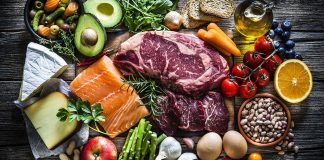COVID-19: Why the Bible’s perspective on social distancing might be a solution
The great challenge facing the world’s leaders right now is identifying an optimal response to a disease bearing several characteristics that make it difficult to combat.
How do I know if I’m infected with the new coronavirus or I have a cold / flu?
More and more people who are experiencing the typical symptoms of a cold and flu are asking the question in the title. This article provides essential information that can help us recognize the danger of infection with the new coronavirus.
What Does the Bible Say About Contagious Diseases (like COVID-19)?
Since the outbreak of the corona virus pandemic, many people are asking faith-based questions. Is this a judgment of God on the human race? Is this a sign of the End? Does Bible prophecy speak about it? Even if people don’t believe in God or the Bible, they are wondering what their Christian neighbors are thinking about the matter.
Laugh your way to a healthier you
We’re born ready to laugh. In fact, as part of a normal baby’s development, they will begin laughing at about the age of three months. That’s long before we begin to say our first words—older babies begin to start speaking at the age of nine to 12 months.
“I have no strength unless I eat meat.” True or false?
Physical strength is often automatically associated with meat consumption, and the association seems logical: doesn't the strength of the animal that has become food pass through digestion to the body that consumes it? This is the question we seek to answer in this article.
COVID-19: What is my risk of developing a serious form of the disease?
Tueday, 31 March 2020, marked exactly three months since the World Health Organization, the Chinese office, was notified of incidences of pneumonia from an unknown cause. According to specialists from the Robert Koch Institute in Germany, we have not yet reached the peak of the pandemic in Europe. We hear about mild and asymptomatic cases, but also about many deaths globally.
God’s providence in times of crisis
Regardless of the form they take, crises give rise to legitimate questions about God's providence: Where is God when we suffer? Has He forgotten us? Is He punishing us? Does He still have things under control?
The Great Reset: a revolution that has been proposed before
Every January, economic and governmental elites gather in their hundreds in Davos, the exclusive ski resort in Switzerland, where the World Economic Forum holds its annual high-level meeting. This year, because of the pandemic, the in-person meeting had to be rescheduled. But the controversies surrounding the meeting's theme – The Great Reset – were not postponed.
Why don’t we eat only brown bread?
This article deals with principles that we know on a theoretical level, but don't really apply in our daily lives. If certain things are true, why are we so reluctant to change?
Twelve months in a year, vitamin B12
The quantity of Vitamin B12 required for a healthy diet is measured in micrograms, but the impact on human health is far greater than these tiny amounts would suggest.
Breathe deep: An interview on vaping with Professor Renee Bittoun
Our brain develops, unfortunately, a quirky response to nicotine. It shouldn’t really be there. It shouldn’t be in your breath, let alone you reacting to it, let alone you smoking anything or vaping anything. We shouldn’t even be near it.
14 reasons why cycling is good for you
Could jumping on a bike enrich your life? Here are some reasons you should consider giving it a go.
“Don’t you have a lifestyle pill?” An interview with Dr Zeno L. Charles-Marcel
Dr Zeno L. Charles-Marcel is an associate director in the Department of Health for the General Conference of the Seventh-day Adventist Church.
Grieving in the Time of COVID-19
11pm and I am worried my patient will not make it till tomorrow morning, says Dr Glenn Wakam. Twelve hours after intubation, the COVID-19 patient's condition deteriorates dramatically, and Wakam knows that an even more difficult intervention follows: to explain to the patient's wife, who begs to be allowed to say goodbye, that the hospital does not allow her this sad privilege.
COVID-19: White money for black days: using savings when you #stayhome
One of the most powerful pieces of literature illustrating the proper preparation for a financial crisis comes from antiquity. More precisely, from the Bible.


























